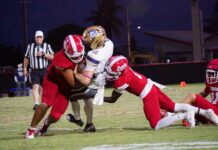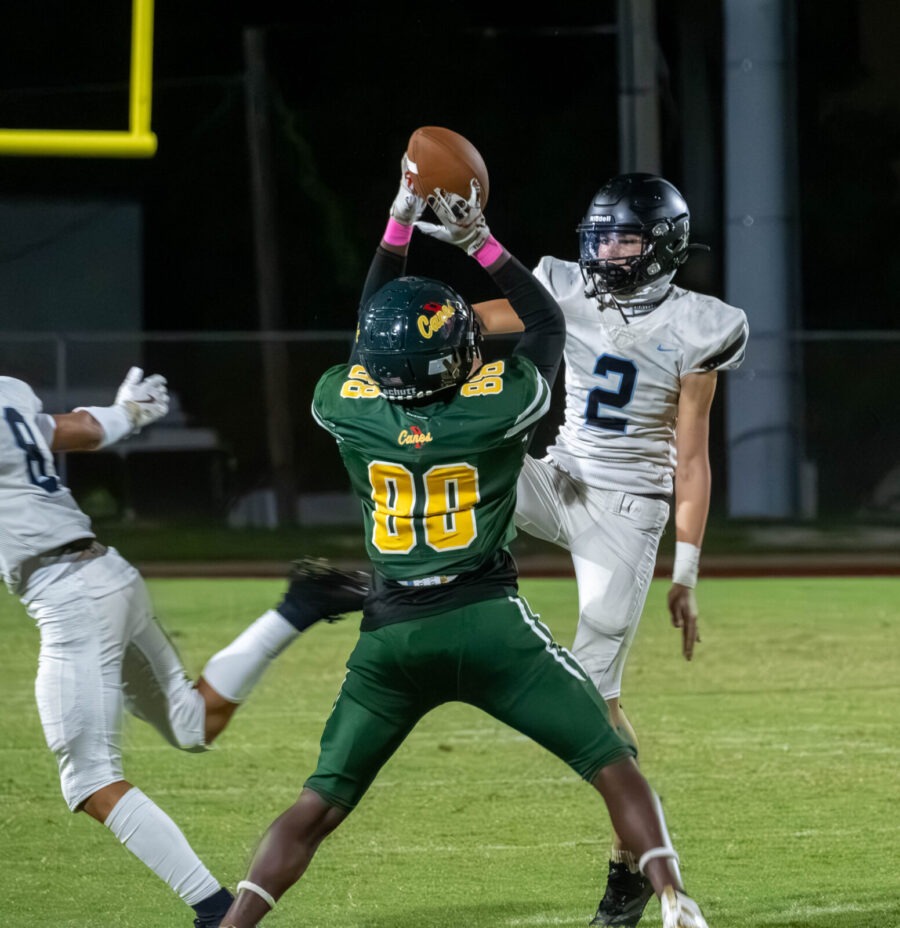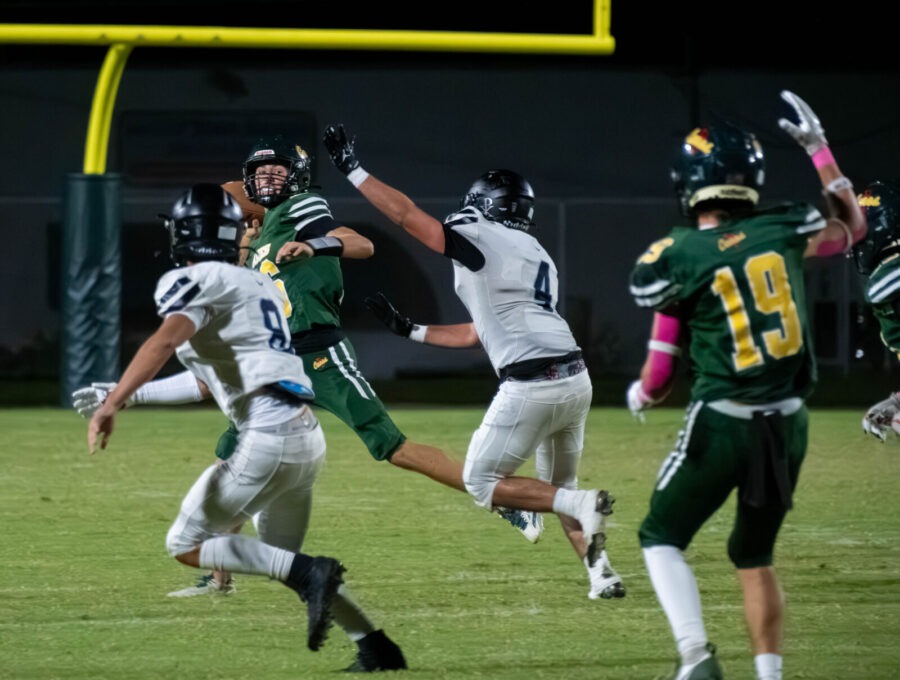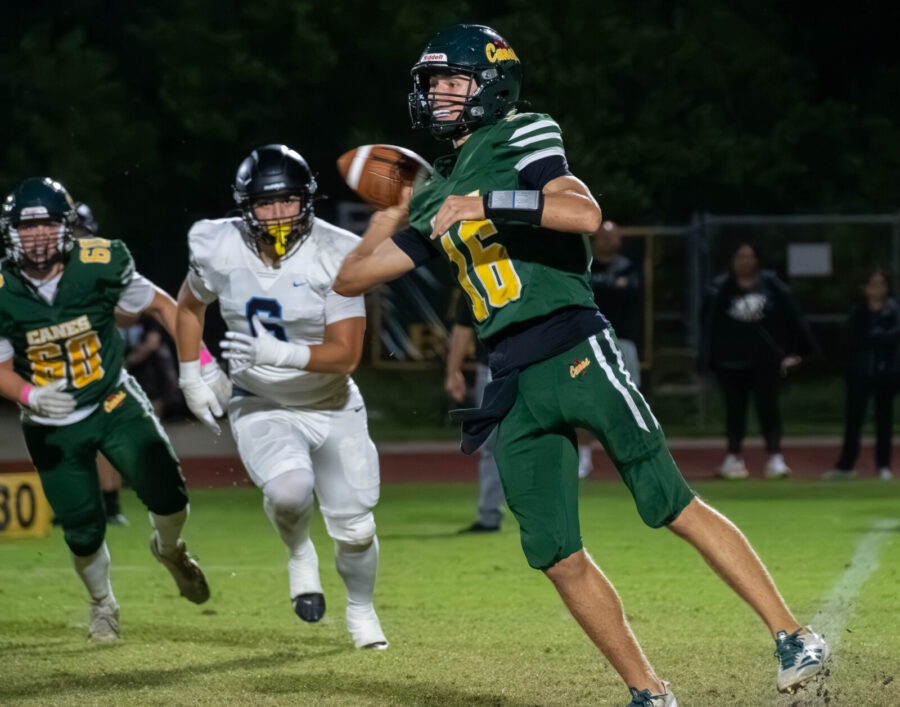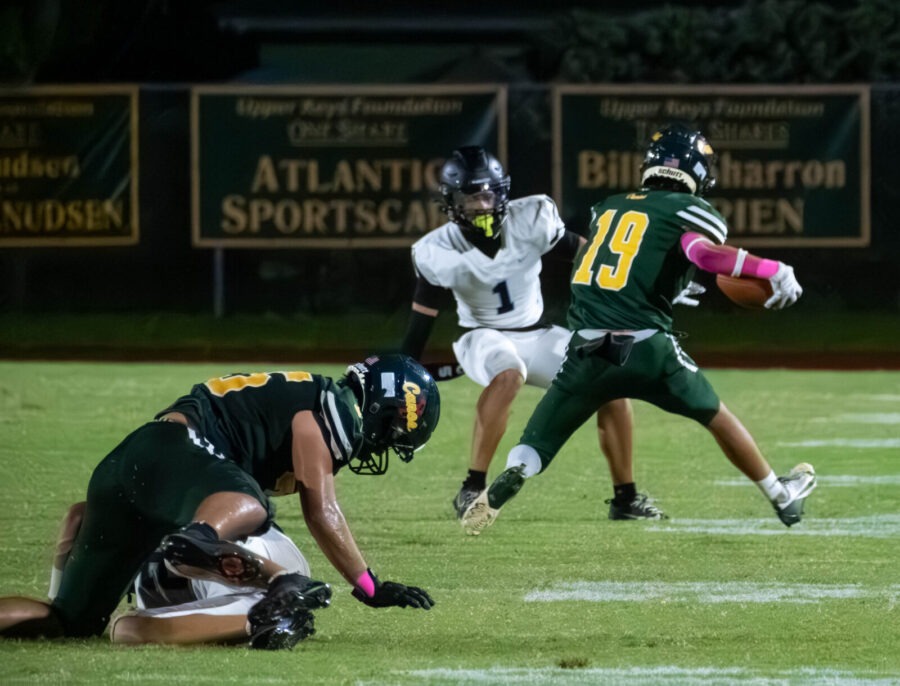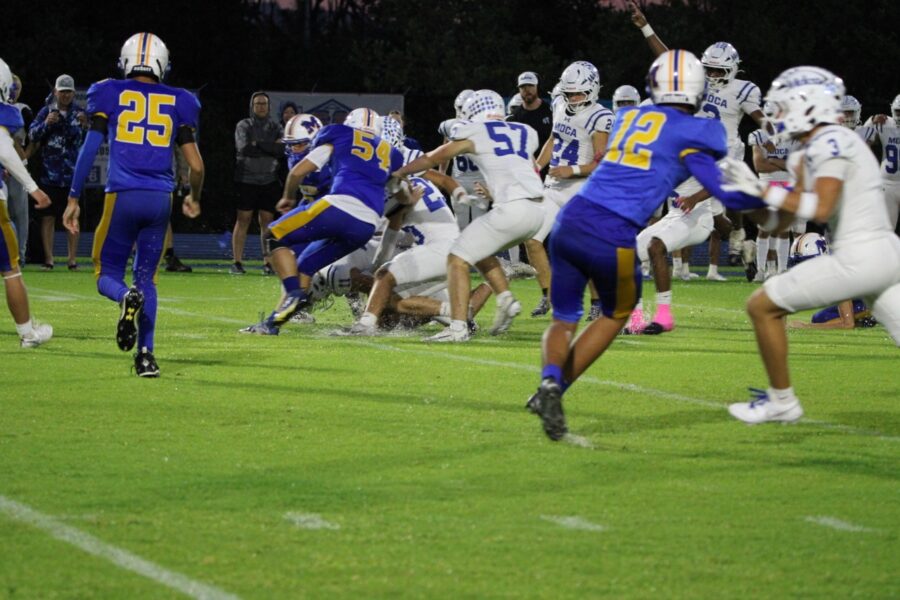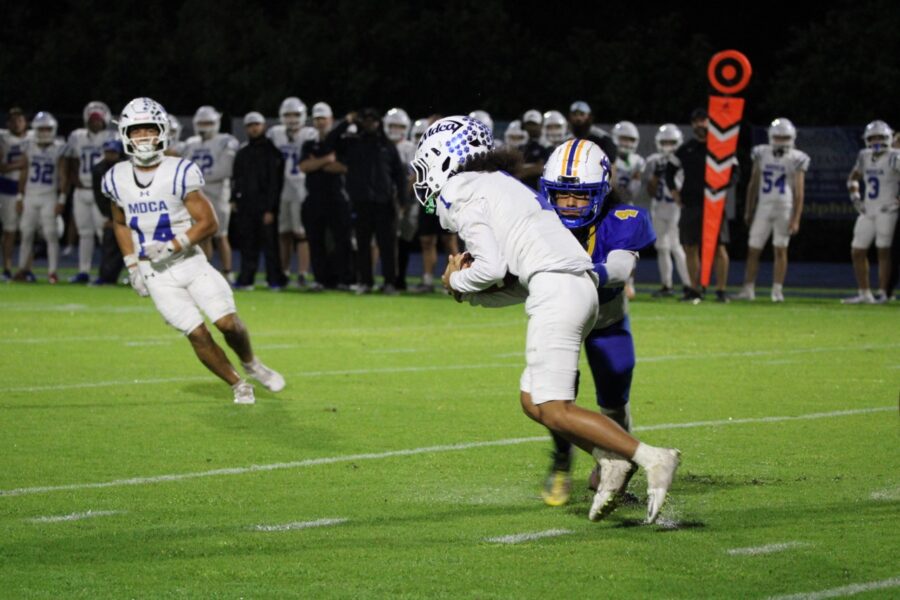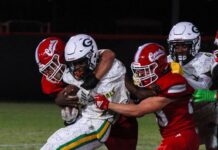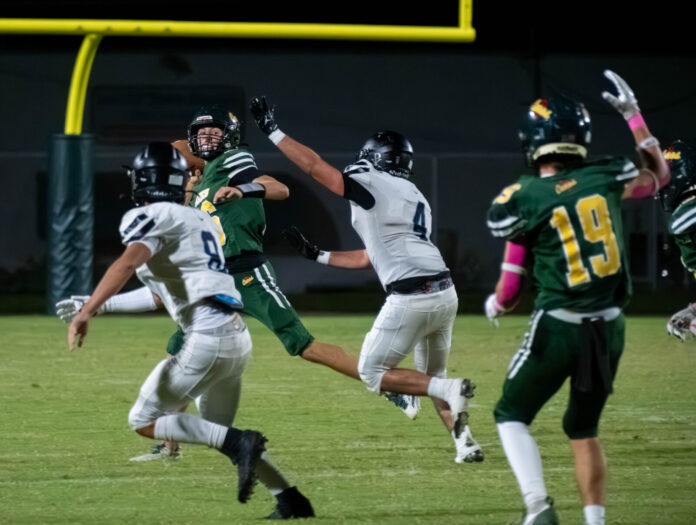
For the first time in at least 20 years, Monroe Country’s three football teams failed to score a single point against their respective opponents last weekend – and while there are a handful of weeks in which Keys teams all lose, a triple-blanking is unheard of. If the FHSAA’s open transfer policy remains as it stands, last week’s anomaly may become more commonplace.
In 2016, Florida House Bill 7029 allowed students to transfer to any public school of their choice, and the FHSAA’s bylaws were changed to accommodate the bill. This opened doors for limited roster changes, and in its early stages, student-athletes typically used the legislation to transfer for academic reasons, with a slower shift in dynamics for athletics.
“We’re geographically isolated,” said Key West coach Johnny Hughes, whose Conchs faced defending state champion Miami Northwestern last week. “We have who we have. That’s not what we were looking at against Northwestern.”
Hughes said his team looked across the line of scrimmage and saw a “football factory.”
“I wouldn’t call it a football team; they’ve only been together a few months. It was a collection of talent. They were loaded,” he said. Indeed, the Conchs faced a quarterback who played at Ransom last year, a North Fort Myers transfer committed to Texas who did not even play, and a bevy of similar talent who likely never set foot on campus beyond their practice schedule. “Personnel was a major issue,” said Hughes.
Even when the Conchs had glimmers of greatness last week, the personnel mismatch was evident. “One of their defensive players, a guy committed to FAU, blew his coverage and we got positive yardage,” said Hughes. “The players started to yell to get him out of the game and they replaced him with a guy committed to FIU instead.”
Coaches across Florida are more and more becoming talent scouts, and recruiting has surpassed coaching in the priorities of many programs. To keep their programs stocked with the best talent, coaches must appease their stars to avoid transfers – even mid-season.
Less than a decade later, transfers for athletics-only purposes are commonplace, with students able to play on teams out of their jurisdiction and even schools they do not physically attend. This has led to “super teams” dominating Florida’s football landscape, making it increasingly difficult for teams like Coral Shores, Marathon and Key West to compete.
“The starting quarterback never came out,” said Hughes, “not even when they were ahead by over 40.”
For Coral Shores, the situation was similar.
“It’s an unfair playing field for sure,” said coach Ed Holly, whose Hurricanes lost 26-0 last week to a stacked Archbishop Carroll. The ’Canes resorted to some unusual playcalling to try to overcome the Bulldogs. Holly praised Sterling Keefe with completing four of seven passes, something completely out of the ordinary for the run-heavy Hurricanes. David Beltran ran eight times for 42 yards, earning each one the hard way, but despite the best trickery in play-calling and grittiest of athletic feats, it was not enough to down the Dogs.
“We know year to year who will be on our rosters,” said Holly, speaking about not just his team, but Marathon and Key West as well. “All three teams have to do an unbelievable job of developing talent, investing in our futures and doing it the traditional way,” he said. “In bad years, we develop the next group and in good years, we have good records. The teams with the most seniors are usually the most successful, then they go and we start over.”
But the struggle of Coral Shores to develop a group of underclassmen takes years, including teaching fundamentals, building camaraderie and a brotherhood, and building size and strength in the weight room. Mainland schools need only recruit ready-made players to dominate schools unwilling or unable to recruit, and those schools are left with gaping holes on their rosters when the powerhouses pluck away talent developed elsewhere.
And while Holly did not mince his words on open transferring and recruiting, he was also adamant that he would not trade his situation with that of teams that can produce an all-star roster overnight.
“I wouldn’t change what we have,” he said. “Our community is so special because our kids play, come back and volunteer and support us, no matter what. I wouldn’t change it for anything. What is our main goal? It’s to make better fathers, sons, husbands and brothers using football as a tool to do this. Recruiting doesn’t accomplish this.”
Between Key West and Coral Shores, Marathon is also feeling the pain of schools that can fill roster spots with a phone call rather than put the work in for years. The Dolphins have not won a game this season, and yet the Fins come to practice daily with good attitudes and a willingness to get better and support one another every day, according to coach Sean McDonald.
“Our guys know what we’re facing each week,” he said. “We don’t just develop kids from freshman year, we do it from middle school on. For them to have the patience and tenacity to endure a season like this one and put themselves out there against a team that has obvious advantages we cannot control is a testament to the character of this team.”
Marathon, with just over 400 high school students, consistently plays schools with triple or quadruple their enrollment. They reclassified as 1A Rural last season, a move that pits them against like-rostered schools in the postseason, but to see more evenly-matched contests, the Fins will have to make it to the postseason, and an 0-8 record against larger opponents will not accomplish that.
Now that the floodgates to transfering and recruiting are open, there is likely no closing them, but Keys teams are not the only ones frustrated with competing against super teams. The FHSAA is working to find a happy balance between the obligation to follow the letter of the law as far as school transfers go and the advantages used by some squads.
To do this, the FHSAA added the Florida Invitational Tournament, or FIT, an extra postseason bracket for teams not qualifying for playoffs in the traditional format. The FIT will include 16 teams beyond the 32 qualifying for playoffs now. But even the addition of FIT will not stop the Wild West of open transfers and unbalance – it merely awards a consolation prize to teams that don’t quite qualify for playoffs.
Next week, Coral Shores faces ABF Academy, a team far more talented than their 2-4 record lets on. Against similar opponents, ABF holds the advantage, but a road trip and the run grind of the Hurricanes could even up those odds. Key West faces 7A Lehigh, an unfamiliar team which, despite a 3-4 record, looks good on film, according to Hughes.
“We need this one,” he said, regarding the Conchs’ hopes of earning home field advantage for round one of the playoffs.
Up next for Marathon is the undefeated Cowboys of LaBelle, a 3A team four hours north. Though the records and rosters are lopsided, the teams both had a desire to rekindle a well-matched and respected rivalry from the past. For decades, Marathon and LaBelle played one another in the final game of the season, a rivalry that is well-remembered by both sides despite not having the longstanding rivalry game since the mid-’90s.
“It was always a pretty physical and hard-fought game,” said LaBelle assistant coach Hal Bennett. Bennett played in some of the final seasons the teams met in what was then referred to as the “end-of-year classic,” and Cowboy players looked forward to traveling to the Keys for a football game.
Bennett described “vivid memories of warming up in the endzone and seeing fiddler crabs scurrying away,” adding that some teammates were a bit unnerved that the entire end zone seemed to move due to the crabs.
He quickly named some of Marathon’s roster who made an impression on him and his teammates. He recalled “a small guy on Marathon’s team that was missing his arm from the elbow down, and how much respect they had for how hard and physical he played.”
Another was Dosey Robbins. “You don’t forget 260-pound tailbacks,” Bennett said. “He may not have weighed that much, but he sure looked like he did!”
Marathon coach Andra Garvey confirmed Bennett’s analysis of Robbins – “yes, he was 250” – and identified Derick Jones as the player with the missing arm. Garvey played against LaBelle when he was a middle school student on the varsity team. It was five years before Garvey was named Florida Player of the Year, but he remembered the games against the Cowboys.
Garvey described the Cowboys as matching Marathon in speed at the time, but being bigger in size. He also remembered plenty of cowbell noise from the fans, and something a bit more unusual the Cowboys packed on the bus. LaBelle fired off a cannon to signify a touchdown. “Everytime they scored, it went off,” Garvey said.
Bennett assures that there will be no cannon Friday night in Marathon, and despite the lopsided records the teams have this season, both coaching staffs hope to rekindle the yearly game.
Photos by Doug Finger, Tracy McDonald and Maicey Malgrat.












